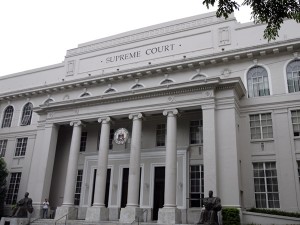SC includes power market regulator, independent power producers in suit
MANILA, Philippines—The Supreme Court ordered on Thursday the groups that sued the Manila Electric Co. for its controversial rate increase to include the regulator of the country’s electricity market and six independent power producers as respondents in the case.
The high court said the government must answer the allegations raised by the petitioners in the suit, including their claims that the Energy Regulatory Commission colluded with the power firms and that the agency’s rule on the approval of generation cost increase was unconstitutional.
Supreme Court spokesperson Theodore Te said the tribunal denied a motion by the Office of the Solicitor General dated January 2 seeking to be excused from commenting on the petitions. The OSG, which represents ERC and the Department of Energy, was given until January 17 to file its comment.
The OSG earlier said that Meralco had the burden defending the public respondents since the ERC and DOE were merely “nominal parties.”
The ERC, however, disagreed with the OSG’s position and filed a 71-page comment on the suit last Wednesday.
Te said the high tribunal gave the petitioners until January 13 to implead as “necessary parties” the Philippine Electricity Market Corp. (PEMC), SEM-Calaca Power Corp., Masinloc Power Partners Corp., Therma Luzon Inc., San Miguel Energy Corp., South Premier Power Corp. and Therma Mobile Inc.
PEMC governs and administers the Wholesale Electricity Spot Market while the other companies are suppliers of Meralco.
The court’s four-page order was signed by clerk of court Enriqueta Vidal and given on the authority of Chief Justice Ma. Lourdes Sereno upon the recommendation of the justice in charge of the case.
In its order, the court noted that public records showed that the six power firms have existing agreements with Meralco and supplied Meralco with power during November 2013 when the generation costs increased.
The tribunal also noted that while the petitioners questioned the “very high ceiling price” of P62 per kiloWatt hours sold at the WESM, they did not implead PEMC, the WESM’s governance arm.
The petitioners alleged that ERC may be in collusion with the power firms but the petitioners did not implead the firms “for a complete determination or settlement of the claim subject of the action,” the court noted.
The court said the PEMC and the power firms were “necessary parties” to the case. The Rules of Court defines a necessary party as “one who is not indispensable but who ought to be joined as a party if complete relief is to be accorded as to those already parties, or for a complete determination or settlement of the claim subject of the action.”
The Rules also state that parties “may be added by court order on its own initiative at any stage of the action and on such terms as are just.”
The petitioners in the case were six party-list congressmen comprising the Makabayan bloc in the House of Representatives and a group led by the National Association of Electricity Consumer for Reforms.
Last December 23, the Supreme Court issued a 60-day temporary restraining order on the Meralco increase and scheduled oral arguments on January 21.
In their suit, the petitioners claimed their constitutional right to due process was violated when the ERC approved the price adjustment without conducting public hearings. They also asked why the ERC, under the DOE, approved the rate increase, without notice or hearing, last December 9 or merely four days after Meralco submitted its proposal.
The public was also not informed of the increase and had no time to contest it because it was not published.
Meralco had already imposed the first tranche of the rate increase this December in the amount of P2.41/kWh by the time the TRO was issued.
Based on the ERC’s order, a P2.41/ kWh increase in generation cost was included in the December billing month, while the February and March bills will reflect increases of P1.21/kWh and P0.53/kWh, respectively.
RELATED STORIES:
ERC: Power rate hike collection scheme above board

